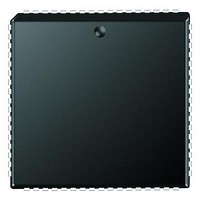PIC18F6680-I/L Microchip Technology, PIC18F6680-I/L Datasheet - Page 126

PIC18F6680-I/L
Manufacturer Part Number
PIC18F6680-I/L
Description
Microcontrollers (MCU) 64KB 3328 RAM 52 I/O
Manufacturer
Microchip Technology
Datasheet
1.PCM18XK1.pdf
(496 pages)
Specifications of PIC18F6680-I/L
Processor Series
PIC18F
Core
PIC
Data Bus Width
8 bit
Data Ram Size
3.25 KB
Interface Type
I2C/SPI/AUSART/CAN
Maximum Clock Frequency
40 MHz
Number Of Programmable I/os
53
Number Of Timers
5
Operating Supply Voltage
4.2 V to 5.5 V
Maximum Operating Temperature
+ 85 C
Mounting Style
SMD/SMT
3rd Party Development Tools
52715-96, 52716-328, 52717-734, 52712-325, EWPIC18
Development Tools By Supplier
PG164130, DV164035, DV244005, DV164005, PG164120, ICE2000, ICE4000, DV164136
Minimum Operating Temperature
- 40 C
On-chip Adc
12-ch x 10-bit
Program Memory Type
Flash
Program Memory Size
64 KB
Package / Case
PLCC-68
Lead Free Status / RoHS Status
Lead free / RoHS Compliant
Available stocks
Company
Part Number
Manufacturer
Quantity
Price
Company:
Part Number:
PIC18F6680-I/L
Manufacturer:
RUBYCON
Quantity:
46 000
Part Number:
PIC18F6680-I/L
Manufacturer:
MICROCH
Quantity:
20 000
- Current page: 126 of 496
- Download datasheet (9Mb)
PIC18F6585/8585/6680/8680
9.6
External interrupts on the RB0/INT0, RB1/INT1, RB2/
INT2 and RB3/INT3 pins are edge-triggered: either ris-
ing if the corresponding INTEDGx bit is set in the
INTCON2 register, or falling if the INTEDGx bit is clear.
When a valid edge appears on the RBx/INTx pin, the
corresponding flag bit, INTxF, is set. This interrupt can
be disabled by clearing the corresponding enable bit,
INTxE. Flag bit, INTxF, must be cleared in software in
the Interrupt Service Routine before re-enabling the
interrupt. All external interrupts (INT0, INT1, INT2 and
INT3) can wake-up the processor from Sleep if bit
INTxIE was set prior to going into Sleep. If the global
interrupt enable bit GIE is set, the processor will branch
to the interrupt vector following wake-up.
The interrupt priority for INT, INT2 and INT3 is deter-
mined by the value contained in the interrupt priority
bits: INT1IP (INTCON3<6>), INT2IP (INTCON3<7>)
and INT3IP (INTCON2<1>). There is no priority bit
associated with INT0; it is always a high priority
interrupt source.
EXAMPLE 9-1:
DS30491C-page 124
MOVWF
MOVFF
MOVFF
;
; USER ISR CODE
;
MOVFF
MOVF
MOVFF
INT0 Interrupt
W_TEMP
STATUS, STATUS_TEMP
BSR, BSR_TEMP
BSR_TEMP, BSR
W_TEMP, W
STATUS_TEMP, STATUS
SAVING STATUS, WREG AND BSR REGISTERS IN RAM
; W_TEMP is in virtual bank
; STATUS_TEMP located anywhere
; BSR located anywhere
; Restore BSR
; Restore WREG
; Restore STATUS
9.7
In 8-bit mode (which is the default), an overflow in the
TMR0 register (0FFh
16-bit mode, an overflow in the TMR0H:TMR0L regis-
ters (0FFFFh
interrupt can be enabled/disabled by setting/clearing
enable bit, TMR0IE (INTCON<5>). Interrupt priority for
Timer0 is determined by the value contained in the
interrupt priority bit, TMR0IP (INTCON2<2>). See
Section 11.0 “Timer0 Module” for further details on
the Timer0 module.
9.8
An input change on PORTB<7:4> sets flag bit RBIF
(INTCON<0>). The interrupt can be enabled/disabled
by setting/clearing enable bit, RBIE (INTCON<3>).
Interrupt priority for PORTB interrupt-on-change is
determined by the value contained in the interrupt
priority bit, RBIP (INTCON2<0>).
9.9
During an interrupt, the return PC value is saved on the
stack. Additionally, the WREG, Status and BSR registers
are saved on the fast return stack. If a fast return from
interrupt is not used (See Section 4.3 “Fast Register
Stack”), the user may need to save the WREG, Status
and BSR registers in software. Depending on the user’s
application, other registers may also need to be saved.
Example 9-1 saves and restores the WREG, Status and
BSR registers during an Interrupt Service Routine.
TMR0 Interrupt
PORTB Interrupt-on-Change
Context Saving During Interrupts
0000h) will set flag bit, TMR0IF. The
2004 Microchip Technology Inc.
00h) will set flag bit TMR0IF. In
Related parts for PIC18F6680-I/L
Image
Part Number
Description
Manufacturer
Datasheet
Request
R

Part Number:
Description:
20-Pin USB Flash Microcontrollers
Manufacturer:
MICROCHIP [Microchip Technology]
Datasheet:

Part Number:
Description:
PIC18F With 128-segment LCD Driver And 12-bit ADC, 8KB Flash, 768B RAM, CCP, MSS
Manufacturer:
Microchip Technology
Datasheet:

Part Number:
Description:
PIC18F With 128-segment LCD Driver And 12-bit ADC, 16KB Flash, 768B RAM, CCP, MS
Manufacturer:
Microchip Technology
Datasheet:

Part Number:
Description:
PIC18F With 192-segment LCD Driver And 12-bit ADC, 8KB Flash, 768B RAM, CCP, MSS
Manufacturer:
Microchip Technology
Datasheet:

Part Number:
Description:
PIC18F With 192-segment LCD Driver And 12-bit ADC, 16KB Flash, 768B RAM, CCP, MS
Manufacturer:
Microchip Technology
Datasheet:

Part Number:
Description:
Microcontrollers (MCU) 48KB 3328 RAM 52 I/O
Manufacturer:
Microchip Technology
Datasheet:

Part Number:
Description:
32kB Flash, 2kB RAM, 1kB EE, NanoWatt XLP, LCD 64 QFN 9x9x0.9mm T/R
Manufacturer:
Microchip Technology
Datasheet:

Part Number:
Description:
32kB Flash, 2kB RAM, 1kB EE, NanoWatt XLP, LCD 64 TQFP 10x10x1mm T/R
Manufacturer:
Microchip Technology
Datasheet:

Part Number:
Description:
128kB Flash, 4kB RAM, 1kB EE, 16MIPS, NanoWatt XLP, LCD, 5V 80 TQFP 12x12x1mm T/
Manufacturer:
Microchip Technology
Datasheet:

Part Number:
Description:
32kB Flash, 2kB RAM, 1kB EE, NanoWatt XLP, LCD 64 QFN 9x9x0.9mm TUBE
Manufacturer:
Microchip Technology
Datasheet:

Part Number:
Description:
32kB Flash, 2kB RAM, 1kB EE, NanoWatt XLP, LCD 64 TQFP 10x10x1mm TRAY
Manufacturer:
Microchip Technology

Part Number:
Description:
128kB Flash, 4kB RAM, 1kB EE, 16MIPS, NanoWatt XLP, LCD, 5V 80 TQFP 12x12x1mm TR
Manufacturer:
Microchip Technology

Part Number:
Description:
Manufacturer:
Microchip Technology Inc.
Datasheet:











